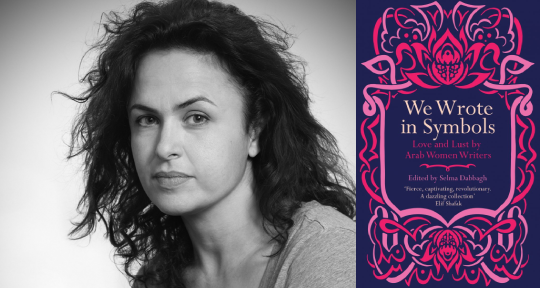We Wrote in Symbols: Love and Lust by Arab Women Writers, edited by Selma Dabbagh, Saqi Books, 2021
As an Egyptian, Arab, and Muslim woman, love and lust have largely occupied two separate worlds in my life. While I yearned for the elusive idea of love in my youth and pursued it in relationships, I had also deeply internalized that it had to end in heartbreak; I believed that love, like many ideas, could never be fully comprehended. But lust was different. Lust was an action—an action to avoid and repress, because it leads to sex, and sex is dangerous. When I started reading We Wrote in Symbols: Love and Lust by Arab Women Writers, I thought of my upbringing, of the two separate worlds I have built for love and lust, and the difficulties of reconciling them in my adult life. This anthology, edited by the British-Palestinian writer Selma Dabbagh and published by Saqi books, includes one hundred and one pieces by seventy-five different women from the Middle East and North Africa region, as well as from the diaspora. Most of the pieces are translated from Arabic, many are originally written in English, and the minority are translated from French.
In the book’s introduction, Dabbagh explains that translating works about love and lust is difficult, though we do not learn about the ways in which the various translations could have impacted the anthology. This is especially pertinent in the cases of translations from Arabic to English, which represent the majority of the works in the text; Arabic can be seen as a unifying language, but the subtleties and differences between the dialects dictate different cultural specificities and reflect a stark diversity in both place and community. In other words, unless the place of origin is clear, the readers lose a sense of place with the absence of dialect, and different geographies and contexts start feeling neutral.
In the introduction, Dabbagh contextualizes the largely overlooked history of erotic female writers in Arabic literature. Although names of ancient goddesses of love and fertility in the Arab region—such as Isis and Ishtar—are well known, the topic of female Arab sexuality still comes as a novelty for many. Similarly, despite the fame of certain Abbasid poets such as Abu Nawas, female poets in elite Abbasid literary salons are not famous, if known at all. This lack of awareness is further complicated by the total disappearance of women erotic writings during the fall of Andalusia in 1492; Dabbagh clarifies that women writing on love and lust faced a blackout for almost half a millennia, reappearing only in the late nineteenth century. By then, authors and novelists—like Zaynab Fawwaz—began challenging common misogynistic practices such as arranged marriages, and therein paved the way for many women Arab writers to discuss sexuality in various literary forms today. Ranging over three millennia, the long span this anthology covers is indicative of the two interests of my review: what lies beyond the celebratory—especially in relation to difficult and/or painful lust—and the limitations of the narrative linking love and lust as two sides of the same coin. READ MORE…



Translation Tuesday: “The Results” by Bernard Comment
"Jealousy is always a weakness, an uncertainty, a lack of confidence, every other person is a competitor, a threat."
On a check-up at a health clinic, a father and husband’s interactions with doctors are punctuated by reminiscences of love and lust for his wife. Gradually, we learn of a chilling act of violence, which leads the protagonist to a twisted reckoning with his mental and physical condition.
It’s cold. A cold that bores into you, that hasn’t let up for days, despite the big woollen jumper I never take off, even at night. Carlo tells me I should take it off for sleeping, and wrap myself up well in the blankets, so that when I get up I would add a garment to make up for the change in temperature, but one evening I tried this and my teeth chattered all night. The other men I see at lunchtime don’t seem to suffer, there’s even a guy who always walks around in a T-shirt, but admittedly he’s a burly fellow, well-padded against the cold.
The doctor made me go back to him this morning, after fasting, he wanted to do further tests, two whole syringes filled with blood, I asked to lie down because I’m always afraid of turning to look, and it’s much worse if you get to see it. The nurse smiled, although I couldn’t tell if it was from pity, sympathy, or scorn. She had difficulty finding the veins, it’s always the same, I begin to tense up, to sweat at the temples, I become dizzy and pale; when I was a teenager I passed out each time, and once I fell backwards and hit my head on a sink, was sent straight to hospital for a battery of tests, a lumbar puncture, and an idiot teacher spread it around that I’d taken an overdose, me who’s never touched the tiniest amount of an illegal substance, for fear of my reaction, and my scrupulous respect for the law.
When I had the first tests, eight months ago, the lady in the laboratory was very considerate, settling me into an armchair and telling me to look away, and to think of something pleasant; so I thought about the film I’d watched the night before, with Julie, her warm body, her breasts in my hands, her smell after making love. Then it was finished, and already I had a piece of cotton wool and then a sticking-plaster on top, whereas here everything is rougher, more brutal. I’ve been waiting for twenty minutes, standing in front of the grey door. They came to get me around six o’clock. Immediate appointment. Everything moved fast, then the iron door in the corridor clanged shut behind me, with a heavy ringing sound, and since then, nothing. The doctor must be on the telephone, I hear his voice at times, a powerful, raucous voice, but I don’t understand what he’s saying, the rooms are well insulated. I’d love to smoke a cigarette, it’s what I’ve been brooding about for a full five minutes, it’d do me good, would relax me, smoking a cigarette.
READ MORE…
Contributors:- Bernard Comment
, - Carolyne Lee
; Language: - French
; Place: - Switzerland
; Writer: - Bernard Comment
; Tags: - clinic
, - condition
, - family
, - french
, - health
, - hospital
, - love
, - lust
, - marriage
, - Short Story
, - Swiss